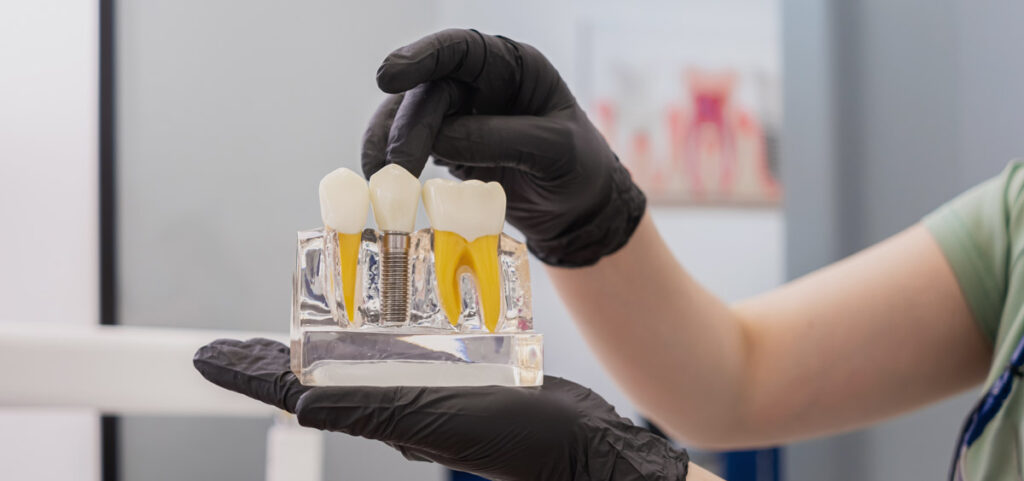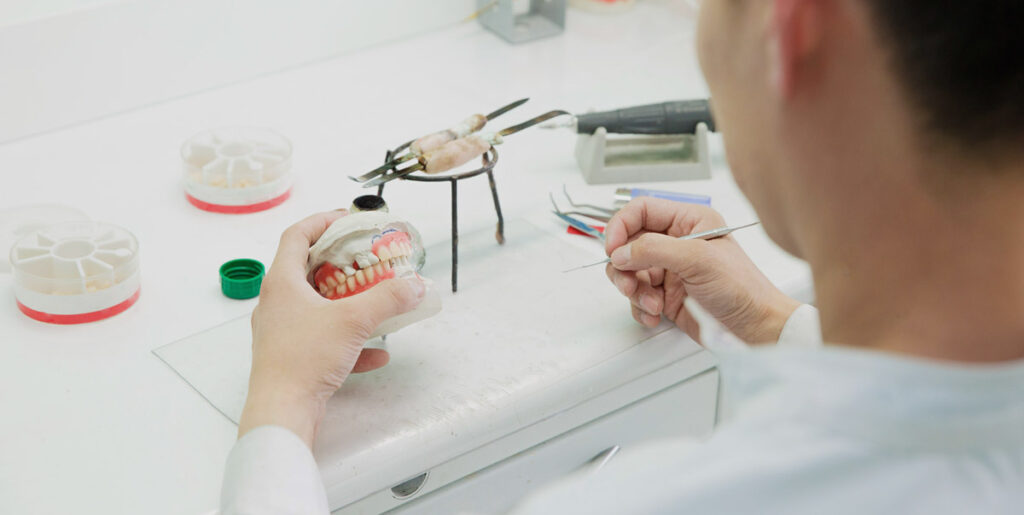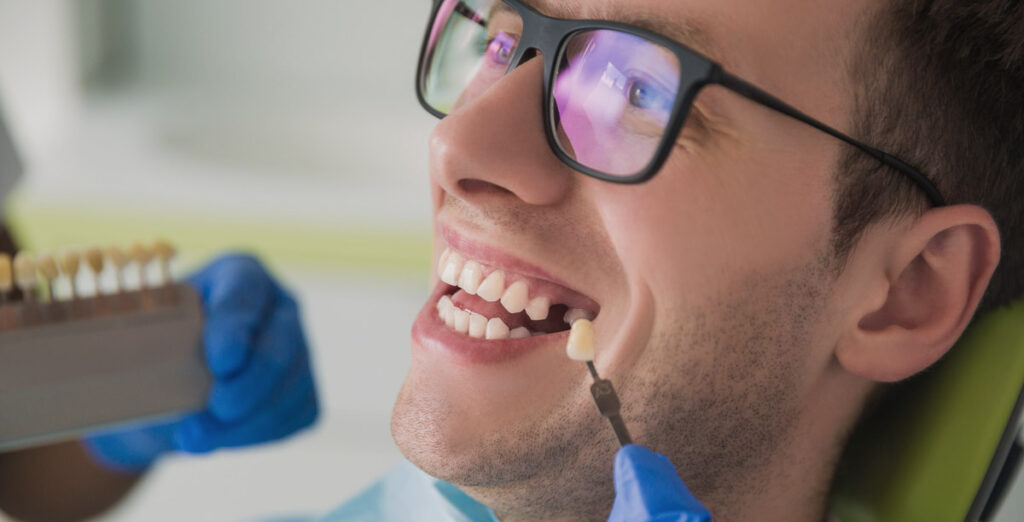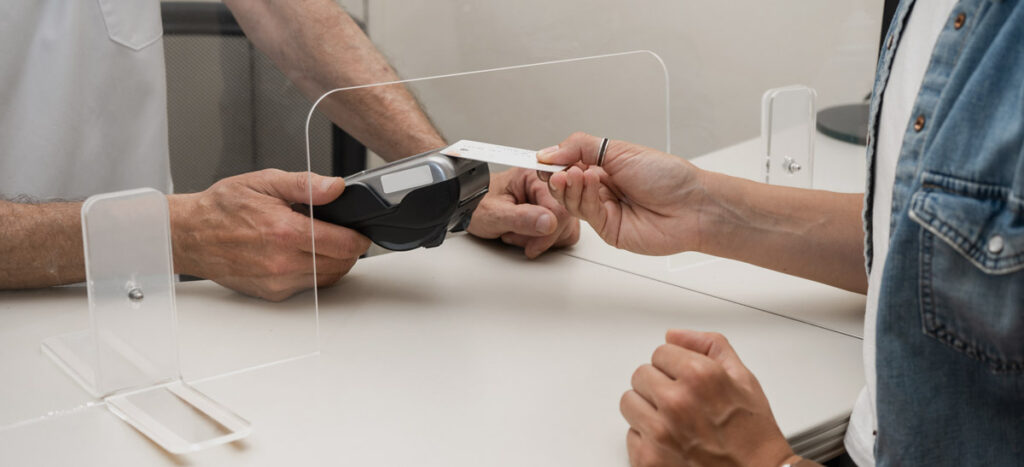Having teeth missing is more common than many people think. Whether through tooth decay, gum disease, a knocked-out tooth, or the natural loss of wisdom teeth, many patients eventually find themselves needing to replace missing teeth.
The gap left by a lost tooth can affect not only your smile but also your ability to chew, speak properly and maintain good oral health. Thankfully, modern dental treatments offer a wide range of tooth replacement options to suit different needs, budgets and lifestyles.
With guidance from an experienced dentist or dental team, you can choose the best solution to replace your missing tooth or teeth and restore a healthy smile.
Understanding the importance of replacing missing teeth
Impact on oral health
When a tooth or teeth are lost, the consequences can extend far beyond the visible gap. Surrounding teeth often shift to fill the empty space, which can cause bite problems and lead to difficulty eating.
Missing teeth can also increase the risk of tooth decay in your remaining teeth and gum disease, since food and bacteria collect more easily in gaps.
The oral health foundation warns that tooth loss can also contribute to jawbone changes and bone loss, which in turn may lead to jaw pain and further dental health complications.
Effects on confidence and daily life
The impact of missing teeth on confidence should not be underestimated. Even one missing tooth at the front of the mouth can affect how you smile, while multiple teeth missing can make speaking clearly more difficult.
Some patients also find that wearing dentures or other types of artificial teeth initially feels unfamiliar. Choosing the right tooth replacement option can restore confidence, improve your ability to speak properly, and allow you to enjoy food without discomfort.

Dental implants
How implants work
Dental implants are one of the most popular and effective ways to replace missing teeth.
A dental implant involves placing a small titanium screw into the jawbone, which acts as a stable root for a replacement tooth. Once the implant has fused with the jawbone over a few months, a new crown is fitted on top, providing the look and function of natural teeth.
Implants can be used to replace a single tooth, several teeth, or even support complete dentures.
Advantages and limitations
Implants are valued for their strength and longevity. Unlike false teeth or removable dentures, implants help preserve the jaw and prevent bone loss. They also protect neighbouring teeth because they do not rely on existing teeth for support.
Many patients find implants feel the closest to natural teeth and are easier to maintain with daily oral hygiene. However, implants require healthy gums and sufficient jawbone, and the treatment takes several months to complete.
Not every patient is a suitable candidate, so an experienced dentist will need to assess your overall health, dental health and jaw condition.
Dental bridges
Traditional dental bridges
A dental bridge is another common option used to replace missing teeth. A fixed bridge works by anchoring an artificial tooth to neighbouring teeth, which are often fitted with crowns made of porcelain or precious metal.
This type of tooth replacement can be a good solution if you have one missing tooth or a small number of teeth missing in a row.
Implant-supported bridges
Implant-supported bridges combine the stability of implants with the practicality of bridges. Instead of relying on surrounding teeth for support, implants are placed into the jaw to hold the bridge in position. This reduces the strain on existing teeth and provides a secure, natural-looking solution.
Implant-supported bridges can be particularly effective when multiple teeth are missing, offering durability and comfort compared to removable dentures.

Dentures
Full dentures
Dentures are removable sets of artificial teeth that can replace a full arch of missing teeth. Complete dentures are used when all teeth in the upper or lower jaw are lost. They are often made from acrylic and designed to fit snugly against the gums.
Although they do not prevent bone loss in the jaw, dentures can restore the appearance of a complete smile and improve your ability to eat and speak. Many patients take a little time to adjust to wearing dentures, but modern designs are far more comfortable than older versions.
Partial dentures
Partial dentures are designed to replace several missing teeth while fitting around existing teeth. They are used to replace missing teeth in a flexible way and are often made with a metal or acrylic framework.
Partial dentures can be removed for cleaning, making them easier to manage for some patients. Although they are less permanent than implants or bridges, they remain a popular and affordable solution provided by many dental practices in the UK.
Temporary tooth replacement options
Removable partial dentures (flippers)
For patients waiting for a more permanent solution, removable partial dentures, also known as flippers, can be used to replace your missing tooth or teeth temporarily. These are lightweight, simple false teeth that fill the gap left while you decide on a final decision about treatment.
Resin-bonded bridges
Another temporary option is a resin-bonded bridge, sometimes called a Maryland bridge. This involves attaching an artificial tooth to the back of neighbouring teeth with a special resin.
While less durable than a fixed bridge, resin-bonded bridges can be a quick and affordable way to restore front teeth or one missing tooth without much preparation of the old tooth structure.

Factors to consider when choosing a treatment
Cost and affordability
The cost of tooth replacement varies widely. Implants are usually more expensive than dentures or bridges, but they are designed to last for many years and may be the best solution in terms of long-term value.
A private dentist can provide a detailed breakdown of costs and explain which options may be covered by NHS or private dental treatments.
Treatment time and number of appointments
Some treatments, like implants, take a few months to complete due to the healing process in the jawbone. Others, such as dentures or fixed bridges, can often be fitted within a shorter timeframe.
If you need a quicker solution, temporary replacements may be used to replace missing teeth while you wait for the final treatment.
Suitability for different patients
Bone health and gum condition
The health of your jawbone and gums plays a major role in choosing the right tooth replacement. Patients with significant bone loss may not be suitable for implants unless bone grafting is carried out.
Gum disease must also be treated before fitting any type of replacement tooth to ensure long-term success.
Lifestyle and personal preferences
Your lifestyle and preferences also matter. Some patients are comfortable with removable dentures, while others prefer a fixed solution that feels closer to natural teeth.
If you struggle with oral hygiene or have had mouth cancer or other serious oral health issues with your other teeth, your dental team will advise on the safest and most effective options.
The final decision should balance your dental health, overall health and personal comfort.
Caring for your chosen tooth replacement
Daily cleaning and maintenance
Good oral hygiene is essential for every type of replacement tooth. Implants, bridges and dentures all need regular cleaning to prevent plaque, tooth decay and gum disease. False teeth should be cleaned daily, and natural teeth around bridges or partial dentures need extra attention to protect surrounding teeth and gums.
Regular dental check-ups
Whether you have implants, dentures, or bridges, regular check-ups with your dentist are crucial. Your dental team will check for signs of wear, ensure your replacement tooth fits correctly, and monitor your oral health to prevent problems like bad breath, jaw pain or difficulty eating.
Experienced dentists will also give advice on how to maintain your replacement options for as long as possible, helping you enjoy a healthy smile and good overall health.

Paying for treatment for missing teeth
Paying yourself or with insurance
The cost of dental treatments to replace missing teeth can vary depending on the type of solution you choose and the dental practice you visit.
Many patients choose to pay privately for treatment, especially for options like dental implants or implant-supported bridges, which are not always available on the NHS.
If you have dental insurance, it is worth checking whether your policy covers certain types of replacement teeth, such as dental bridges or dentures. Some policies will only cover part of the cost, so it is important to review the details before making a final decision.
Getting a payment plan from your dentist
If you do not want to pay the full cost upfront, many dental practices in the UK offer payment plans to spread the cost over several months.
This can make treatments like implants or complete dentures more affordable while still allowing you to replace your missing teeth without long delays.
A private dentist or dental team will explain the options available, including interest-free plans in some cases, helping you choose the best solution for both your dental health and your budget.

Medicred: helping you restore your smile with flexible payment plans
At Medicred, we believe restoring your smile should never be delayed because of cost. Our dental loans give you the flexibility to spread payments, with a simple online application and quick approval. This means you can start treatment straight away and pay back in manageable instalments.
We work with private dentists and dental practices across the UK to make treatments such as implants, bridges, dentures and other solutions more affordable. Our focus is on removing financial barriers so you can choose the best option for your oral health and enjoy a confident, healthy smile.
With Medicred, you can move forward with the treatment that suits you best, supported by a clear process and flexible finance options. Your smile and your budget are both in safe hands.
FAQs
What happens if I don’t replace a missing tooth?
If you do not replace a missing tooth, several problems can occur over time. The teeth next to the gap may shift, causing misalignment and making it harder to bite or chew properly. Your remaining teeth may wear down unevenly, and there is a higher risk of tooth decay and gum disease.
The jawbone where the tooth was can shrink, which may change the shape of your face and make it harder to fit future implants or dentures. Missing teeth can also affect your speech and confidence, and some patients find eating certain foods uncomfortable or painful.
How long will it take to get used to my new replacement tooth?
Getting used to a new replacement tooth can vary depending on the type of tooth replacement and your mouth. For single tooth implants or fixed bridges, most patients adapt within a few days to a couple of weeks. If you have dentures, it may take a few weeks to feel completely comfortable, as your gums and jaw need to adjust.
Speaking and eating may feel different at first, and some minor soreness or pressure is normal. Regular check-ups with your dentist help ensure your replacement tooth fits correctly and any adjustments needed are made quickly.
Is replacing a tooth painful?
Replacing a tooth is usually not very painful because your dentist uses local anaesthetic during most treatments, such as dental implants, bridges or extractions before fitting a replacement tooth. You may feel some pressure or mild discomfort during the procedure, but it should not be sharp pain.
After treatment, it is normal to experience some tenderness, swelling or minor jaw pain for a few days. This can usually be managed with over-the-counter pain relief. Following your dentist’s advice on oral hygiene, eating soft foods, and attending follow-up appointments helps your mouth heal quickly and keeps your replacement tooth comfortable.
Will a replacement tooth look and feel natural?
Yes, most replacement teeth are designed to look and feel like your natural teeth. Dental implants, fixed bridges, and modern dentures are carefully matched to the colour, shape, and size of your existing teeth, so they blend in well. Many patients find that implants and implant-supported bridges feel very similar to a single tooth or multiple teeth they have lost, allowing them to chew and speak comfortably.
Dentures may take a few weeks to get used to, but once fitted properly, they can look very natural. Regular dental check-ups ensure your replacement tooth stays comfortable and maintains a healthy smile.
What are the potential risks or complications of getting artificial teeth?
Getting artificial teeth is generally safe, but like all dental treatments, there can be some risks. For dental implants, possible complications include infection, swelling, bruising, or minor jaw pain after surgery. Implants may not fuse properly with the jawbone in rare cases. Dentures or partial dentures can cause sore spots, difficulty eating, or slipping if they do not fit correctly.
Bridges may affect neighbouring teeth if they are not prepared properly. Good oral hygiene, regular check-ups, and following advice on caring for your replacement tooth or teeth help reduce the risk of problems and keep your mouth healthy.
Will replacing a missing tooth improve my appearance and confidence?
Replacing a missing tooth can have a big impact on your appearance and confidence. A gap left by one missing tooth or multiple teeth can change the way your smile looks and affect how you speak. Dental treatments like implants, bridges, or dentures restore your smile, helping your replacement tooth or teeth blend naturally with your existing teeth.
Many patients find they speak properly again without any sort of lisping, which also improves self-esteem. Choosing the right solution with the help of your dentist ensures your smile looks healthy and natural, giving you more confidence in everyday life.
Is a dental implant better than a bridge or dentures?
A dental implant is often considered the closest option to natural teeth. It is placed into the jawbone, which helps prevent bone loss and keeps neighbouring teeth stable. Implants can last many years and feel very secure, making eating and speaking easier. A fixed bridge can replace one missing tooth or several teeth, but it relies on surrounding teeth for support and may affect them over time.
Dentures are removable, often less expensive, and can replace multiple teeth, but they may feel less natural and take time to get used to. Your dentist can help you choose the best solution for your mouth and lifestyle.
Can I eat as normal with a replacement tooth?
Yes, most replacement teeth allow you to eat normally, but it can take a short time to adjust. Dental implants and implant-supported bridges feel very similar to natural teeth and are strong enough for most foods soon after healing. Fixed bridges are also stable, but you may need to be careful with very hard foods at first.
Dentures and partial dentures can restore chewing, but they may take a few weeks to feel completely comfortable, and sticky or hard foods can sometimes be tricky. Following your dentist’s advice on care and adjusting gradually helps you enjoy food safely.
How do I choose the best solution for my missing teeth?
Choosing the best solution depends on your oral health, the number of teeth missing, your jawbone, and personal preferences. Dental implants can feel like natural teeth and prevent bone loss, while fixed bridges may be quicker to fit but rely on neighbouring teeth for support. Dentures are removable and can replace multiple teeth, but may take time to get used to.
Cost, treatment time, and lifestyle should also be considered. An experienced dentist or dental team can examine your mouth, discuss your options, and help you decide on the replacement tooth or teeth that will restore your smile and keep your oral health strong.
Does smoking affect the lifespan of artificial teeth?
Yes, smoking can affect the lifespan of artificial teeth. Smoking slows down healing after treatments like dental implants, making it harder for the implant to fuse with the jawbone. It also increases the risk of gum disease and tooth decay, which can affect surrounding teeth and the stability of bridges or dentures. Dentures may stain more quickly and become less comfortable over time.
Quitting or reducing smoking can help your replacement tooth or teeth last longer and maintain good oral health. Your dentist can give advice on caring for your teeth and gums to protect your new smile.